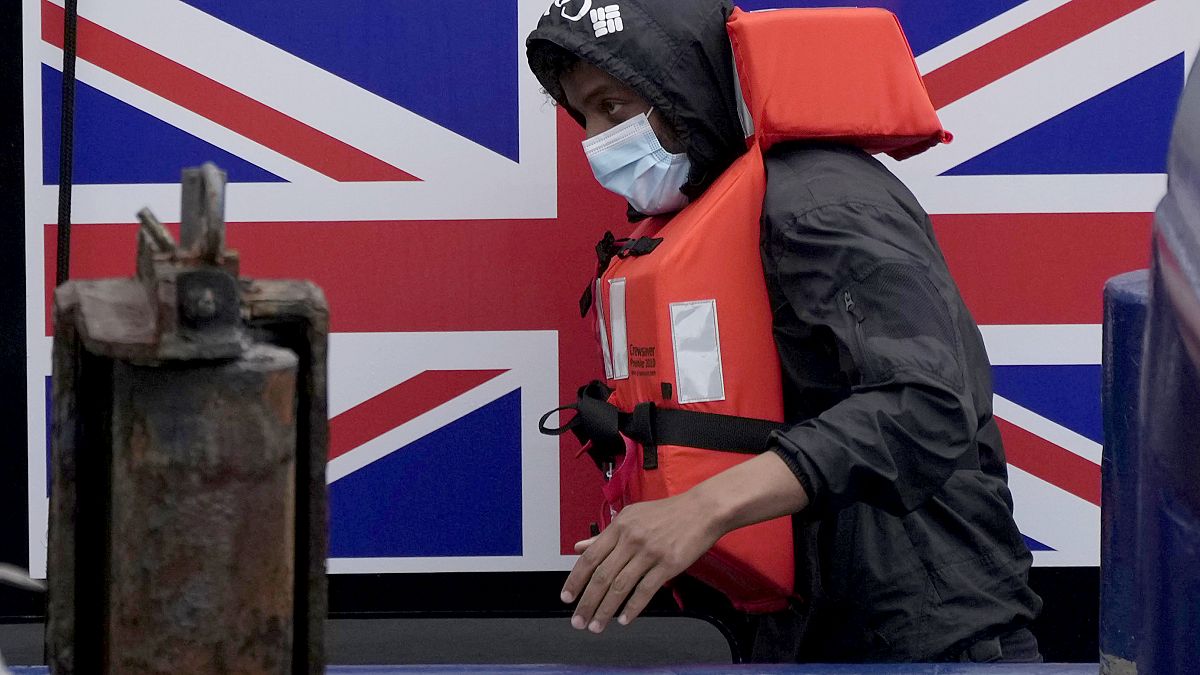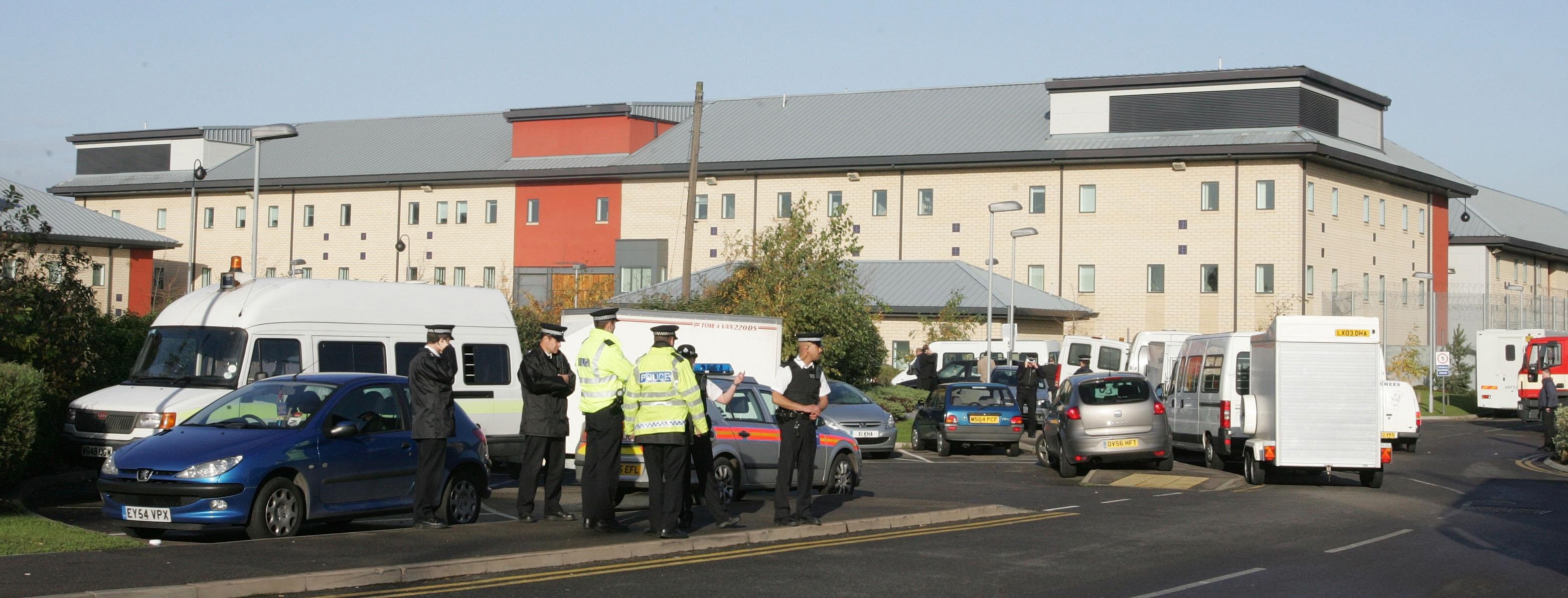Alarm sounded over 'prison-like' conditions in UK immigration centres

A new report has urged UK authorities to make a raft of improvements inside immigrant detention centres, including detention conditions and staffing issues.
Immigration detention centres in the United Kingdom still have a long way to go.
That's according to a new report by the European Committee for the Prevention of Torture (CPT) released on Thursday.
During a visit to the country between March and April 2023, it flagged up several issues surrounding the uncertainty of how long migrants will be detained, "prison-like" conditions in centres and the treatment of those displaying symptoms of mental illness.
The UK government blasted the report, saying it did not "recognise much" of its content.
The CPT report put forward a set of recommendations for Downing Street, which is currently trying to get its controversial bill to deport asylum-seekers to Rwanda through the House of Lords.
The UK should introduce a time limit for holding people under immigration legislation, with the uncertainty of not knowing the length of detention having a negative impact on detainees, it says.
At the moment, the UK 1971 Immigration Act does not establish a time limit for detention.
This means people can spend six months, and even a year or two in a detention facility, Hugh Chetwynd, executive secretary of the CPT, tells Euronews.
“The uncertainty when you get detained for how long you’re going to be there plays into your well-being,” Chetwynd says, “especially if you haven’t committed a crime and you’re going to be removed.”
Prison-like facilities and poor ventilation
The CPT visited four detention centres located across the country: Derwentside (near Newcastle), Brook House (Gatwick Airport) and Colnbrook and Harmondsworth (London area).
Detention centres are generally well-equipped, according to the report. Some rooms include televisions, cupboards with locks, a seating area and windows that can easily be opened.
Yet, the CPT determined Brook House and Colnbrook detention centres remain prison-like and “not appropriate for holding persons."
While Brook House has been trying to create a better environment by including wall art, more efforts should be made, the CPT says.
Some people reported headaches in centre due to the lack of ventilation in the cells, with the CPT reporting mould.
The delegation also received complaints about the food in all four centres. Concerns surrounded inadequate portions and poor quality.
There are no indications of physical ill-treatment of staff members to detainees, the report says.
It indicates people working in facilities are generally supportive and have good relationships with everyone.
Yet, at Colnbrook and Harmondsworth, there were alleged reports of abusive language by staff members. At Brook House, the CPT noted moments of “dismissive behaviour and a lack of engagement” by staff.
Concern over treatment of people with mental health illness
People in detention centres have good access to mental health teams, the CPT reported.
But it said the transfer of patients with “severe symptoms of mental illness” to a psychiatric hospital remains a concern.
The CPT also found that some people who have been considered to be unfit for detention were kept in the centres.
Under UK rules, vulnerable people must be brought to the attention of the authorities that make decisions on detention. If a person's health is likely affected by detention, authorities must then assess whether they should be released, the report says.
Still, the CPT found in some centres, people were categorised incorrectly and stayed in detention despite the implications for their health.
Their report raised concerns about the deportation processes of foreigners who had committed crimes in the UK, finding they were "locked up 23 hours a day in their cells in poor conditions with little prospect of removal could amount to inhuman and degrading treatment."
In response, the UK government said it “does not recognize much of the content of this report” as it “does not accurately reflect the important work we undertake to ensure the safety and wellbeing of those in our care.”
They claimed the UK has long fulfilled its human rights obligations and ensured the protection of liberties.
One Somalian man was held in immigration detention for four years
Holly Bancroft
Social Affairs Correspondent
THE INDEPENDENT
Migrants facing unlimited detention in “prison-like” UK immigration sites are being handcuffed to beds and allowed to self-harm, a European anti-torture committee has found.
Long stretches of confinement with no end in sight for asylum seekers mean they face mental breakdowns, inspectors from the Council of Europe committee on the prevention of torture reported. They also received reports of fights and a nine-hour stand-off between asylum seekers and guards.
Inspectors also criticised the practice of handcuffing women to beds when they make external hospital visits even when guards are present.
In a report published on Thursday, inspectors also criticised the UK’s Rwanda bill, which aims to send asylum seekers to the African nation, for eroding “basic safeguards that protect people from being potentially subjected to torture and inhuman or degrading treatment”.
They listed a number of incidents where migrants’ mental health had deteriorated while being detained in the UK.
Sile Reynolds, head of asylum advocacy at Freedom from Torture, said the report showed “escalating institutionalised cruelty towards asylum seekers and other marginalised migrants”.
She added: “It’s unacceptable for survivors of torture and other refugees to be detained. And the government must end this practice immediately. A more compassionate approach is essential to protect the safety of people who have fled unimaginable horrors.”
At Heathrow’s detention centres, Harmondsworth and Colnbrook, there were 18 episodes of self-harm in March 2023.
Eight instances were recorded despite the detainees having been assessed as being at risk of suicide.
One of the people had self-harmed three times and had been under constant observation. After coming off the constant watches, he then died by suicide in his cell.
The detention centres at Brook House, near Gatwick, and Colnbrook “remained prison-like”, the inspectors found, adding that this was “not appropriate” for immigration detention.
They added: “The very fact that there is no maximum period of detention and that persons may be held for several years is a trigger for becoming mentally unwell.”
Mental health teams at the detention centres told the inspectors that they were unable to properly care for some patients who really needed to be in a psychiatric hospital.
At Brook House, one person with a history of mental illness started to deteriorate in December 2022. While he waited for a transfer to hospital in another wing, he refused to take his medication and had force used on him four times.
He was eventually transferred in March 2023, but staff at Brook House said a dispute over which organisation would pay for the hospitalisation had delayed help. Government guidance says that patients should receive transfers from detention to hospital within 14 days.
In the first three months of 2023, force was used by Brook House staff 78 times. However, inspectors said that in most cases the use of force was minor.
At the Heathrow centres, Colnbrook and Harmondsworth, force was used by staff on 26 and 20 occasions respectively in the first three months of 2023. At Harmondsworth, a number of detainees staged a protest on 28 March after rumours spread that several people at the centre had died.
The report said there were “some initial chaotic scenes on the first-floor landing, with various detained persons and custodial officers grappling on the floor with each other”. The situation was then defused and the stand-off, which had begun at 11am, ended at around 8pm.
Inspectors also raised concerns about the policy of “handcuffing vulnerable women to a bed when they have to visit an external hospital”, condemning the practice as “excessive and demeaning”. They added: “There is no need for this when the woman is escorted by at least two staff members.”
In response, the government said that each person handcuffed will have undergone a risk assessment based on their own personal circumstances.
Steve Smith, CEO of Care4Calais, said: “Prolonged periods of detention, insufficient medical care, and physical restraint are all bad for people’s physical and mental health. The government should wake up to the fact that the UK’s detention system destroys lives and introduce humane alternatives, not seek to massively expand the current cruel system.”
One migrant at Colnbrook detention centre told inspectors that there was no way to get immediate emergency help if his mental health deteriorated rapidly. He said that his and other detainees’ mental health could alter quickly depending on their situation inside the centre and news from the Home Office or their families.
Inspectors also raised concerns about the long stretches of time that foreign criminals were being held in prison after they had served their sentences. They raised the case of a 67-year-old Chinese national, who had been diagnosed with psychosis, who was held in Pentonville Prison under immigration detention powers for 20 months. He was spending more than 23 hours a day confined to his cell, only leaving to wash.
The inspectors noted that there was little prospect of him being returned to China imminently because of the “apparent inability to obtain a travel document for him”, adding: “It is also difficult to comprehend why arrangements for the return of this person could not have been made prior to the termination of his 12-year prison sentence.”
The man was eventually deported to China more than seven years after he had been sentenced for a violent offence in 2016.
According to the most recent figures from July last year, some 78 people have been held in prison for more than 18 months under immigration powers.
A Home Office spokesperson said: “The welfare of individuals in our care is of the utmost importance and we are committed to ensuring that detention and removals are carried out with dignity and respect.
“We have made significant reforms over the past few years to ensure that decisions to detain vulnerable people are made with systematic safeguards in place. We continue to focus on these priorities, while tackling abuse of the immigration system.”
Inspectors visited five UK immigration detention sites and two prisons, Pentonville and Wormwood Scrubs, last spring.
Of those who had left immigration detention during the first few months of 2023, 82 had been held for between six months and 12 months. Thirty had been there for between one and two years and five were held for between two and four years. There was one case of a Somalian migrant who had been in detention for over four years.
This Somalian man was deported in August last year, the government said.
Inspectors did not visit Wethersfield, a former airbase in Essex that is the subject of a legal challenge brought by a refugee charity against the Home Office. The site came into use after the European visit.




No comments:
Post a Comment